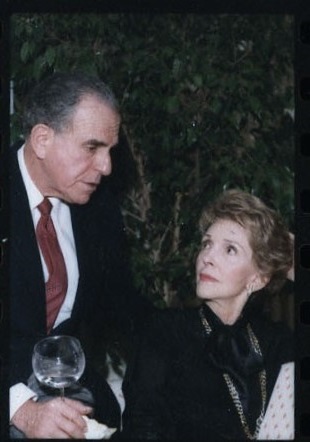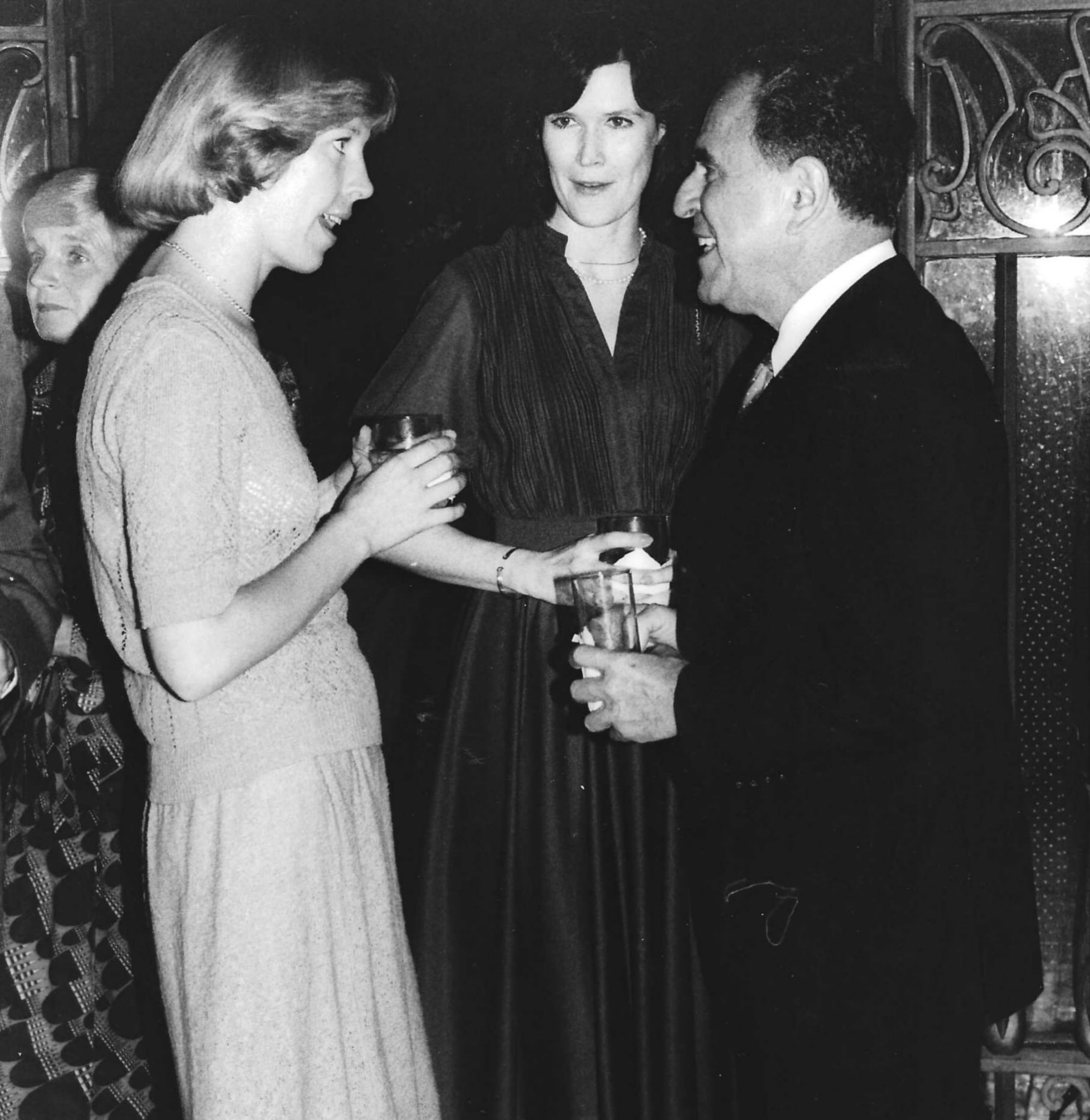Remembering Charles Z. Wick -- A Few Chime In
 Compiled by Bill Wanlund
Compiled by Bill Wanlund
The May 26 PDCA Update’s “Good Reads” included a reminiscence by Joe O’Connell, acting public affairs officer for former USIA Director Charles Wick. O’Connell chronicles the quirks and contributions of USIA’s longest-serving chief – eight years, spanning the entire presidency of Ronald Reagan, 1981-89. The Update invited readers who were with USIA during the Wick years to send in their own recollections of this complex man. Here are some we received.In the photo, Mr. Wick visits with First Lady Nancy Reagan at his Christmas party. The Wicks and the Reagans were said to spend time together every Christmas.
Judith Siegel worked in educational and cultural affairs at USICA/USIA from 1981-2006,. She wrote:
Charlie was walking down K Street at lunchtime when he ran into Frances Humphrey Howard, the late [Senator] Hubert Humphrey's sister. Frances looked just like Hubert so was easy to identify, but he also knew her from occasional Humphrey Fellowship events that he had attended, and had known Humphrey himself from LA political circles.
He greeted her warmly and asked if there was anything that he could do for her. “Well, yes,” she said. “You could put more money into ‘Hubert's scholarships.” [Humphrey Fellowships are offered to qualified early- to mid-career professionals from other countries for 10 months of independent academic study in the U.S.]
When he returned to headquarters he called the Bureau of Educational and Cultural Affairs [or ”E”] front office and told us to find a big chunk of money to move to the program. He told us - in his LA vernacular - why it was a great program in a way that anybody (i.e., he) would understand. And we increased the budget line item request the next year.
And Judy contributed another.
Especially for those who worked on the eighth [top] floor of the USIA building [at 301 4th St. SW] where a number of "front" and area offices were located, receiving a first-thing-in-the-morning "Z-gram" was a common occurrence (the “Z” was for Charlie Wick's self-adopted middle initial – as in Harry S Truman, just an initial without a name attached). In those pre-email days, they were transcriptions of his quick overnight thoughts for action items and questions that I think he recorded for quick transcription in the morning. They would be typed up and hand-delivered to the relevant office.
One morning we were handed a Z-gram that had apparently already made its way to the EU front office down the hall, requesting a very quick and nicely printed translation of the Bill of Rights for Charlie to take with him later in the day when he would depart for a meeting with Alexander Yakovlev, then Head of the Department of Propaganda of the Central Committee of the Communist Party of the Soviet Union. Their meeting was probably on the front end of the 1985 US-USSR Summit [in Geneva].
EU said the translation couldn't be done in the few hours that were left before departure - that the translator would need more time to consider the precise words, given the challenges of translating such an important and nuanced document. However, Charlie, who rarely would be deterred from something he felt strongly about, kicked it over to the ECA front office where I worked at the time. It landed on my desk. I knew nothing of the Russian language but did know Charlie; I also sympathized with EU's concern, two competing equities.
Still, duty called. I argued that the translation needn’t be perfect, just “good enough”. I must’ve been convincing: A few hours later Charlie had the document in a folder and was on his way [maybe in his bulletproof raincoat? [See John Quintus’s account, below.]
I was told after the Wick-Yakovlev meeting that Charlie had the paper folded in his breast pocket and at the right moment took it out with a flourish and said, "You guys need to read this." [Editor’s note: Yakovlev probably did read it. A close adviser to then-Soviet President Mikhail Gorbachev and a fierce advocate of Soviet democratization, he’s been called “the father of Glasnost.”]
Since her retirement, Judy has been an adjunct associate professor at NYU's Center for Global Affairs.
Retired FSO John Quintus writes of a raincoat and a legacy.
I would like to add a note to O'Donnell's memories of Director Wick. The Director did indeed wear his "bulletproof" raincoat when he visited the Embassy in Bonn in about 1983. I recall a colleague in the USIS [U.S. Information Service] office telling me he almost dropped the coat when Wick handed it to him, not knowing that it was extremely heavy. It was our understanding that the Director was concerned that he was the potential target of an assassination attempt.
While USIS officers appreciated the attention and funding that Director Wick brought to USIA, and the Worldnet [live-by-satellite TV] innovation was a tool that I found quite useful, in general the Director was a source of embarrassment and unfriendly humor among the people I worked with during Wick's tenure. His friendship with President Reagan not only helped USIA's status in the 1980s, but it also saved Mr. Wick's ashtray on several occasions.
John has taught both English and International Relations courses at the University of Delaware, including graduate courses on U.S. Foreign Policy, since he retired from the State Department. He also has taught classes on Mozart, Verdi, and Puccini at the Osher Lifelong Learning Institute in Wilmington, and has published several articles on Victorian literature. “Mostly,” he says, “I've managed to stay alive.”
Retired FSO Joe Johnson, a USIA veteran and a member of PDCA’s Board, recalls an encounter in Rome with Wick the Showman.
 Charles Wick led a dance band in his college days at the University of Michigan, and he would tickle the ivories when he saw a piano in the room. When Ambassador Maxwell Rabb hosted him at the Villa Taverna [the Ambassador’s residence in Rome] in September 1982, Wick struck up a conversation with my wife Barbara and Leslie Shapiro, the wife of Howard Shapiro, an assistant cultural affairs officer, and learned that they were both from Texas. (In the photo, l-r: Leslie, Barbara and Wick.) As we left the party, Wick -- sitting at the piano -- began to play “The Yellow Rose of Texas.”
Charles Wick led a dance band in his college days at the University of Michigan, and he would tickle the ivories when he saw a piano in the room. When Ambassador Maxwell Rabb hosted him at the Villa Taverna [the Ambassador’s residence in Rome] in September 1982, Wick struck up a conversation with my wife Barbara and Leslie Shapiro, the wife of Howard Shapiro, an assistant cultural affairs officer, and learned that they were both from Texas. (In the photo, l-r: Leslie, Barbara and Wick.) As we left the party, Wick -- sitting at the piano -- began to play “The Yellow Rose of Texas.”Photo: Wick chats with Leslie Shapiro (l) and Barbara Johnson at the Villa Taverna in Rome.
Joe, now retired from USIA and State, is a member of PDCA’s Board and an amateur cartoonist.
Finally, Rick Ruth, a long-standing executive assistant, describes an unpredictable front office environment and Wick’s last day at USIA.
There were both highs and lows serving as Director Wick's Executive Assistant. All my predecessors could tell stories. He could be, by rapid turns, volcanic, dynamic, visionary, generous, and cringe-worthy. I prefer to remember him as he was on his last day as USIA Director--mellow and reflective. He only stayed part of that day, packing up a few personal items. The final thing he wanted to do was to visit the European Area Office [EU]. His primary interest during his tenure had been, of course, the Soviet Union; he had received tremendous support over the years from EU and wanted to thank them in person. His office was on one end of the 8th floor of USIA Headquarters and EU was just steps away, at the opposite end of the same floor.
In a truly fitting example of his contradictions, Wick did not know where EU’s offices were -- people came to see him, not the other way around. But that day we went down to EU, he said farewell to the folks that happened to be there, then we went down to the lobby and out to the sidewalk. His driver, the ever-courteous and even-tempered Mr. James Rayford, was waiting with his car at the curb (as the head of an independent agency, the USIA Director had his own USG-provided vehicle).
I opened the rear door for him. He got in. I wished him well and closed the door. Off he went.
Since retiring, Rick has been working as a part-time advisor to the Assistant Secretary of State for Educational and Cultural Affairs, and serving on the Global Advisory Council of World Learning, an educational, development, and exchanges organization.
In case you missed it, here is the Joe O’Donnell interview that recalled Director Wick’s tenure. Many thanks to those who have provided their reminiscences; we welcome additional memories – send them to editor@publicdiplomacy.org.